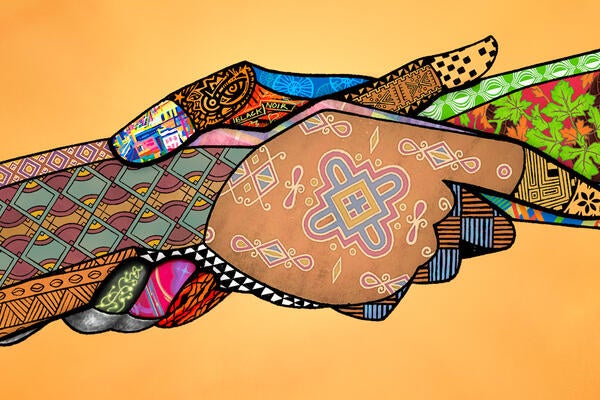
Celebrating National Indigenous History Month and National Indigenous Peoples Day
Recognizing the role we play in building and fostering a strong and healthy connection with Indigenous Peoples

Recognizing the role we play in building and fostering a strong and healthy connection with Indigenous Peoples
By Vivek Goel President and Vice-ChancellorYou may have noticed that at University of Waterloo events, we begin with a land acknowledgement that recognizes that much of our work takes place on the traditional territory of the Neutral, Anishinaabeg and Haudenosaunee peoples. We also highlight that our main campus is situated on the Haldimand Tract, the land granted to the Six Nations that includes six miles on each side of the Grand River. I often expand upon the acknowledgement by personally encouraging attendees to deepen their own understandings of Indigenous cultures and histories.
I hope these land acknowledgments encourage true reflection throughout the year. It is especially important that we intentionally take time as we celebrate National Indigenous History Month and National Indigenous Peoples Day to honour the history, heritage and diversity of First Nations, Inuit and Métis Peoples, and to celebrate the achievements of our Indigenous community members.
Last week, at each Convocation, we were privileged to have the Cedar Hill Singers open our celebrations with traditional drumming and an honour song. Indigenous Knowledge Keeper Myeengun Henry provided very moving opening and closing remarks that reminded us of our connections to the traditional landkeepers of this region.
The richness of Indigenous histories in our region, across Canada, and around the world provide true insight into where we live. The stories passed from one generation to another provide a rich tapestry of the changes to the land, its people and the climate.
Now is also an important time to reflect on Truth and Reconciliation, and acknowledge that there is still much to do in order to address the many inequalities and challenges established over generations of colonialism, intolerance and lack of action.
We recently passed the one-year anniversary of the discovery of 215 unmarked graves at the site of a Kamloops residential school. That number continues to rise as more sites are investigated. It is imperative that we continue to support members of our community who are affected by these horrific losses, and continue the important work of Truth and Reconciliation on our campuses.
Reconciling with Indigenous communities is our shared responsibility. And it is one I take very seriously as president and vice-chancellor. The University’s active work in this area takes place through research, learning, teaching, and community building, and is centralized within the Office of Indigenous Relations. We work collaboratively on- and off-campus to not only advance the goals of the 94 Calls to Action outlined in the Truth and Reconciliation Report, but also to create a long-term vision for the University that is grounded in decolonization.
The President’s Anti-Racism Taskforce’s recently published report also outlined recommendations that include decolonizing approaches to our programs and services, examining how we can incorporate Indigenous ways of knowing into our work, providing supports and mentorship opportunities for our Indigenous members of our community, and hosting events to support and celebrate Indigenous identity, among others. I look forward to working with the University community to implement these recommendations.
Understanding Indigenous histories and cultures, and taking responsibility are vital components of the reconciliation process—as an institution, as individuals, and as a society. If, like me, you wish to learn more, I encourage you to review the Waterloo Library’s Indigenous Peoples in Canada reading list (among other resources) to put recent events in context and help situate them within the landscape of Canada’s colonial history. I also encourage you to follow the work of our Office of Indigenous Relations, participate in the events hosted this month dedicated to cultural learning, and to build your knowledge and allyship.
I hope your learnings and reflections this month will help you make meaningful contributions to the work of reconciliation that will benefit the post-secondary education sector, and ultimately the social fabric of the country.
Miigwech (thank you) for doing your part to champion reconciliation in our community.

Read more
A message from the President and Vice-Chancellor

Read more
As we prepare to celebrate Fall 2025 convocation this week, I would like to extend my heartfelt congratulations to our class of 2025.

Read more
President Goel has informed the board he will not seek a second term as president to focus on his family
The University of Waterloo acknowledges that much of our work takes place on the traditional territory of the Neutral, Anishinaabeg, and Haudenosaunee peoples. Our main campus is situated on the Haldimand Tract, the land granted to the Six Nations that includes six miles on each side of the Grand River. Our active work toward reconciliation takes place across our campuses through research, learning, teaching, and community building, and is co-ordinated within the Office of Indigenous Relations.